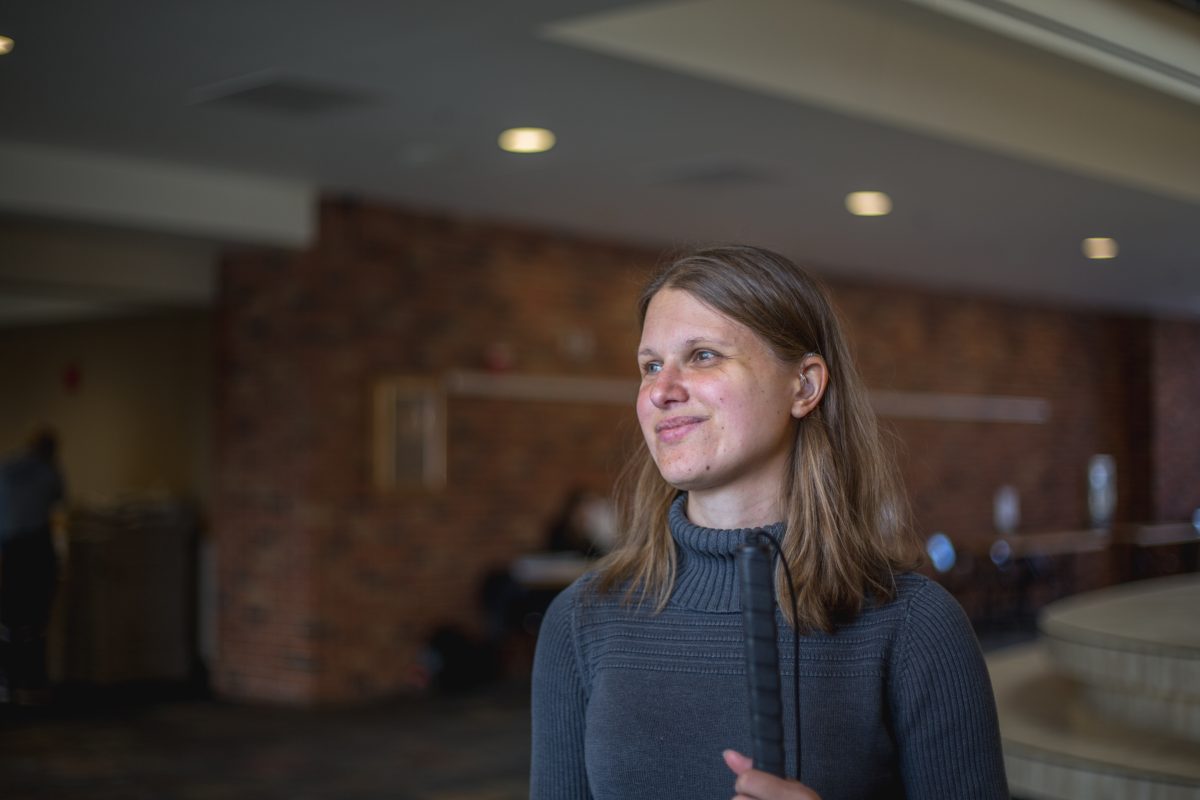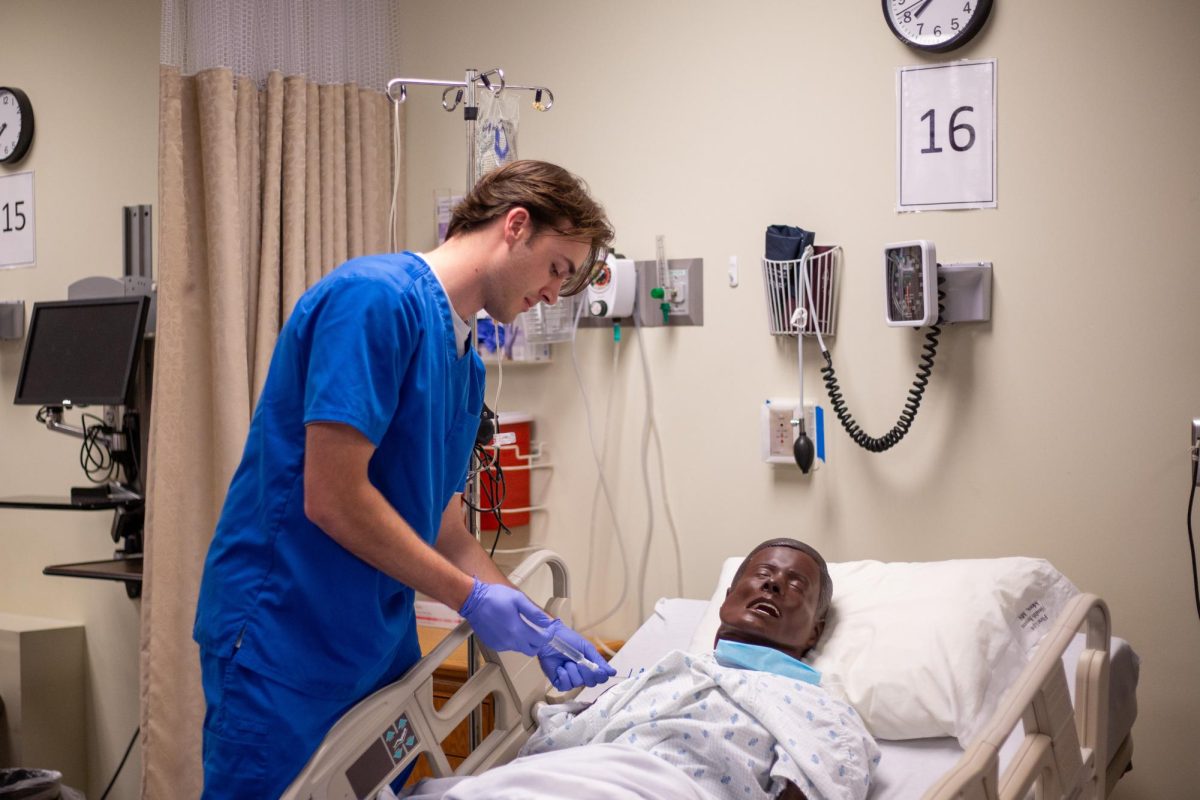Junior Hannah Harriman doesn’t have sight, so she relies on God’s vision for her as she navigates college and life beyond.
By Jamie Hudalla and Bri Shaw
Hannah Harriman grips the handles of a red Polaris ATV on her 16th birthday in the Wisconsin woods. I’m going to hit a tree, she thinks. Why don’t they have Sarah drive? Even a 9-year-old would be safer behind the wheel. Her dad, Dion, sits behind her, making sure she doesn’t run into trees or brush. He tells her to take slight rights and lefts, but she veers sharply.
“I admire the fact that you’re trying to be cautious, but you’re going way too slow,” her dad says.
She inches the half mile out of the woods and onto the rocky dirt road that led to her cabin in Balsam Lake. I would probably be failing my driver’s test right now, Harriman thinks. Most people get their license when they turn 16, but because Harriman is blind, her parents provided a milestone without the plastic card.
When Harriman was born, doctors gave her parents a three-page document on a rare genetic disorder called incontinentia pigmenti, along with a list detailing their daughter’s possible medical problems. This list included neurological problems, vision impairments, deafness, musculoskeletal disorder and more. Over time, her parents learned she had a detached retina in her right eye, cerebral palsy in her right side and hearing impairment in her left ear. At 21, Harriman has undergone roughly 20 surgeries – so many she doesn’t know the exact number. By 6-months-old, Harriman continued growing while her right eye did not. By age 2, her traumatized optic nerves caused her to lose sight entirely.
Harriman’s impairments haven’t hindered her motivation. While most BU freshmen learn their route to classes during welcome week, Harriman learned how to find her fall semester classes in May of last year, and memorized the route to her spring semester classes last December. Shouldering her Vera Bradley backpack and gripping her red and white cane, she would glide it back and forth along the ground like a windshield wiper, feeling where the sidewalk met the grass or where the metal railing met the backpack-ridden floors. She carefully calculated every step – 25 from Arden West to the DC doors – even how to go up and down stairs.

And when one of Harriman’s psychology textbooks in braille didn’t come in time, she set aside an entire Saturday to read the 80 pages of braille after the due date had passed. She didn’t have to – she simply wanted to say that she had done it.
“In general, society has low expectations for blind people with disabilities, so those qualities are what I use to exceed people’s expectations,” Harriman said. “The more that someone says you can’t accomplish this, the more I’m going to be driven to prove them wrong.”
Part of Harriman’s determination stems from “Team Harriman,” a term her dad coined to describe working together as a family. Though Harriman is not able to drive – besides ATVs – she contributes to Team Harriman in other ways. She might help her younger sister decide what classes to take at college, or spend mornings with her mom doing devotions. In turn, Harriman’s parents sit with her while a vacuum sucks out her plastic eye once a year for cleaning. They don’t keep score – they use their strengths to benefit the whole. This is expected of every member of the family.
Harriman and her two younger sisters are also expected to get four-year degrees, so she intends to graduate from Bethel in spring 2019 with a degree in relational communication and a minor in psychology.
“We want to give Hannah every opportunity to have experiences,” Gretchen, Harriman’s mom, said. “…to live life to its fullest, to really build on her ability to learn and grow her heart for others and use those in ways that we would expect any of our other children to.”
Though her mom has helped make schoolwork, travel and transportation accessible, Harriman learned to rely on herself by attending Minnesota State Academy for the Blind directly after high school. There, she gained confidence by living independently, working in a music class and cooking. Through trial and error, Harriman learned to boil food by setting a timer on her phone, since she couldn’t rely on her hearing or vision to know when it was done.
After spending a year and a half at the academy, Harriman felt confident in her academic skills and work experience, so she enrolled at Century College. She had reservations over social conflicts that happened at Stillwater High School a few years earlier, but she thought, college kids are smarter than that. Harriman soon realized she was mistaken.
…
Three weeks into her spring semester at Century, her friend asked her to attend a healing ceremony at her church. Harriman didn’t know what to say at first – she’d never been asked that before. I don’t believe in this stuff, but maybe God has a plan through this, she thought. That weekend, she went on a church retreat with her mom. After praying and asking her family, she finally came to a conclusion.
“That may be for some people, but that’s not for me,” she told her friend.
Her answer produced an explosion of angry comments. Three days a week for the next 15 weeks, her friend would place objects in the aisle of the classroom for her to trip over. She berated Harriman for what she saw as not stepping out in faith, and threw Bible verses at her to support her point. When Harriman told her it wasn’t God’s plan for her life, she labeled it an excuse.
“The way you are now is the way Satan wants you,” her friend said. “You’re worthless without a miracle.”
Harriman was offended at first, but she was determined not to let the comments affect her, and her determination held out — for a while. These are attacks from Satan, she convinced herself. These are nothing but lies. But after two months, she started to believe the words hammered into her brain.
Harriman stopped volunteering and raising her hand. She no longer tried to confront her friend, believing there was nothing she could do. So Harriman prayed, demanding answers to explain her friend’s actions. God, why would you make me go through this? What is the point in all of this?
One day, someone from Harriman’s public speaking class noticed her change. They didn’t know each other well, but Harriman’s lack of involvement tipped him off.
“What the heck happened to you?” he asked.
She didn’t want to open up at first, but eventually the healing conflict trickled out of her. Her friend’s response surprised her.
“I grew up as a Christian, but I’ve started to walk away from the faith,” he said. “Seeing the grace and the mercy you’re displaying to this girl is bringing me back to the faith.”
Harriman needed these words. The hurt and confusion didn’t mend overnight, but an idea started to resonate with her. Instead of asking for help, Harriman asked herself how her blindness could help others.
“I slowly began to realize maybe it’s not me who God is trying to change,” Harriman said. “I may be an instrument He’s using in another person’s life.”
Firm in her identity, Harriman doesn’t pray for healing. However, this hasn’t stopped others from praying for her. While on vacation or outside her front door, strangers have asked to lay hands on her. She acknowledges their good intentions, but she thinks they’re not giving enough credit to God.

Also, she thinks it’s awkward.
“They’re not praying alongside you – they’re praying that something will change and not being receptive to whatever God’s answer would be if it’s not what they want to hear,” Harriman said.
She knows God could cure her at any second, but she doesn’t believe that’s His plan. She’s content with how God made her – asking for sight would be an act of disobedience contradicting that contentment. For her mom, there’s tension in knowing Jesus healed the blind, while also knowing that doesn’t make Harriman unworthy if healing doesn’t occur.
“The testimony she has and the opportunities she’s been given is a way that God is using her to draw others to Him. It’s a hard thing to reconcile for me,” her mom said.
…
Bethel senior Libby Lambert was drawn to Harriman five years ago when they met during their junior year of high school in Stillwater’s concert choir. Lambert didn’t know Harriman was blind at first — she thought she squinted from smiling so big. She was caught off guard when Harriman asked her to direct her to a chair one day. Lambert didn’t know how to guide someone. What if she moved her into a wall? Harriman grabbed her arm and told her to walk, rather than having Lambert grab her.
“Hannah has given me so much perspective in the realm of patience,” Lambert said. “She’s patient with the people who don’t know what she’s capable of.”

After graduation, Harriman plans to show what she’s capable of by investing in the community who’s invested in her. She hopes to work in disability services, likely at a college. Though she doesn’t necessarily want to live in the Twin Cities, it’s one of her only options to have access to good public transportation. But even if she has to spend $35 on a taxi from Stillwater, or wait hours for Metro Mobility to show up, she says she’s headed in the right direction.
Since the ATV, Harriman has already added a pontoon and a pick-up truck to her driving record. Next year, she’ll add Sweden and Estonia to the places she’s visited. Beyond that, she might add a job at the Wisconsin School for the Blind. School administrators Have already asked for her resume. Though it’s uncertain where Harriman will end up, one thing is clear: she’ll master more ATVs.

![Nelson Hall Resident Director Kendall Engelke Davis looks over to see what Resident Assistant Chloe Smith paints. For her weekly 8 p.m. staff development meeting in Nelson Shack April 16, Engelke Davis held a watercolor event to relieve stress. “It’s a unique opportunity to get to really invest and be in [RAs’] lives,” Engelke Davis said, “which I consider such a privilege.”](http://thebuclarion.com/wp-content/uploads/2024/05/041624_KendallEngelkeDavis_Holland_05-1200x800.jpg)




















Becky peterson • Apr 25, 2018 at 6:16 pm
Hannah is a true inspiration! She will continue to be a beautiful instrument in bringing others to a better understanding of grace, disability awareness, and true Christian living.